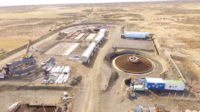Summit Agricultural Group, an Iowa-based agribusiness firm and renewable energy developer, plans to build a large-scale aviation jet-fuel-from-ethanol production plant on the Gulf Coast that will license newly created Honeywell technology and is boosted by new federal tax incentives.
The company said on May 15 it created Summit Next Gen, a sustainable aviation fuel group to develop the first plant, “expected to be the world’s largest” at 250 million gallons per year of production, company spokesman Izak Christensen told ENR.
“There is ample runway for the 100-billion-gallon-per year jet fuel market” to build additional projects, he said, adding that the sector is expected to double in the next 20 years. The fuel will be blended with traditional supply at the approved 50% rate.
Burns & McDonnell is designing the project in collaboration with Honeywell. It is expected to come online in 2025, but Summit would not provide any other information on its timing, cost or location—noting only that it would have “access to significant logistic and utility infrastructure.”
Based on a cost estimate for another similar type of facility being developed, the Summit project cost could be from $5 billion to $6 billion.
Honeywell will provide engineering and technical services, equipment, catalysts and adsorbents for startup and continued life of the project. The technology can be modularized off-site, with its modular construction approach set to shave one year off completion, a spokeswoman told ENR.
Summit Next Gen expects to create an additional market for low-carbon ethanol producers. Governments, companies and consumers are demanding low carbon alternatives to traditional jet fuel, the company said.
Current production of sustainable aviation fuel is challenged by the low supply of feedstock. The Next Gen project will add low carbon ethanol to the feedstock mix, said Summit.
Expanding sustainable aviation fuel feedstocks to include ethanol, biomass and carbon dioxide is essential to increasing the share of the cleaner supply in total jet fuel demand, said Barry Glickman, vice president and general manager of Honeywell Sustainable Technology Solutions.
“Ethanol to jet fuel is a natural next step for the ethanol industry,” Summit AG Investors President Justin Kirchhoff, said in a statement. “We believe ethanol has a material advantage in these areas relative to existing sustainable aviation fuels feedstocks.”
The Biden Administration announced in 2021 the sustainable aviation fuel "grand challenge"— for the U.S. to produce at least 3 billion gallons a year by 2030 and reduce emissions from aviation by 20% with a goal of meeting 100% of aviation demand by 2050. The 2022 Inflation Reduction Act made sustainable aviation fuel credits more valuable than those for other renewable fuels at $1.25 to $1.75 per gallon.
Washington, D.C.-based DG Fuels said in March that it is evaluating a 3,000-acre site in St. James Parish, La., for an estimated proposed $3.1 billion sustainable aviation fuel plant set to produce 120 million gallons annually. The developer has a process for using agricultural and timber waste as feedstock.
Black & Veatch is performing the front-end engineering design study at the site, CEO Michael Darcy told ENR.
He said the analysis should be completed in August, with a final decision to build the plant made by the end of the year. Darcy noted that the company is working with the U.S. Energy Dept, and that construction and commissioning would take about three years.
DG Fuels has sold all of the plant's initial production capacity to buyers that include Delta Airlines, which agreed to purchase 55 million gallons annually for a seven-year period beginning in 2027; and Air France-KLM, which agreed to buy 21 million gallons per year for 10 years, beginning in 2026, according to S&P Global.
Sustainable fuel will make up 65% of aviation sector decarbonization, according to International Air Transport Association data reported by S&P.






Post a comment to this article
Report Abusive Comment